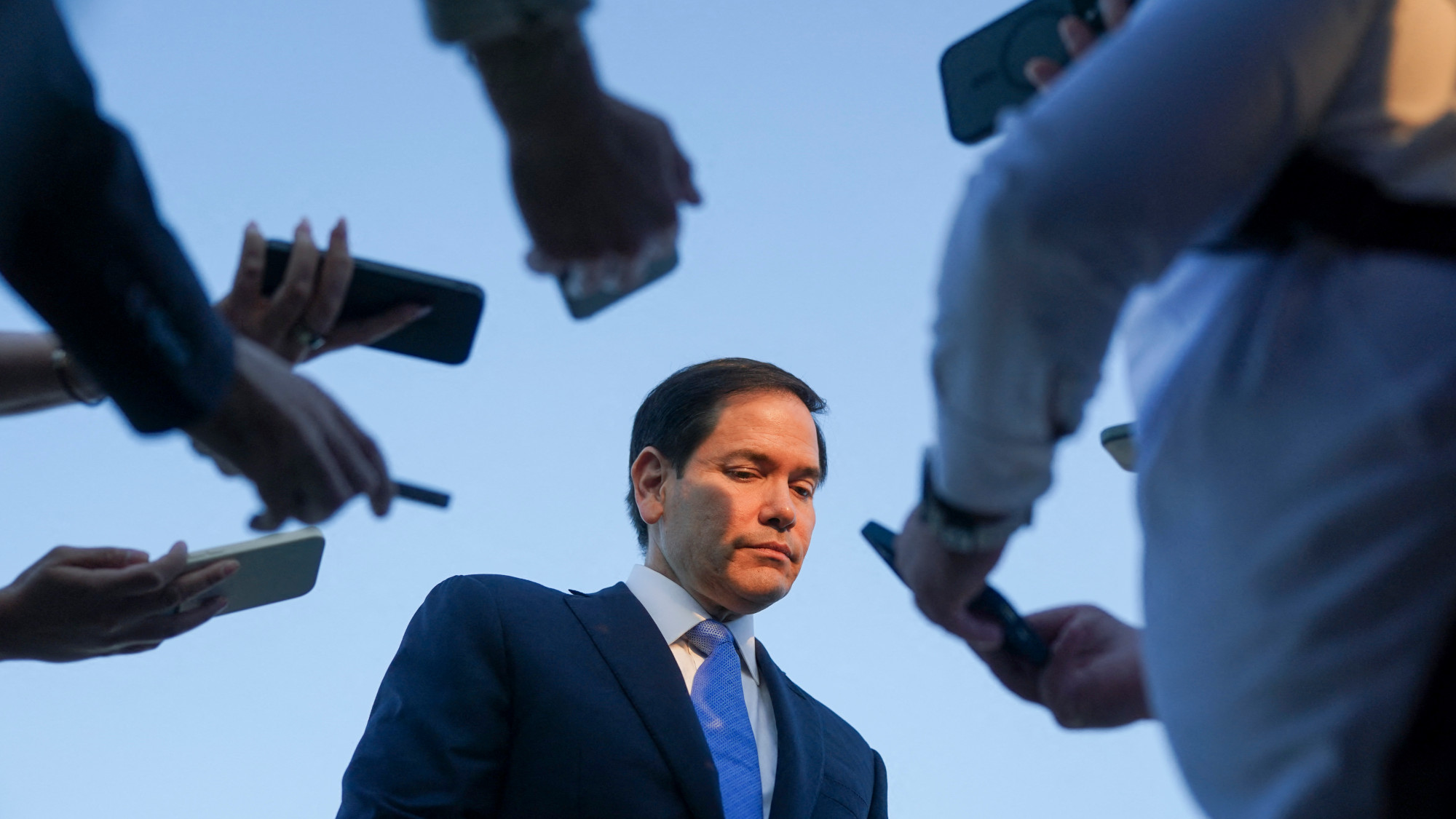Do MAGA Republicans want to bomb Mexico?
For a cadre of conservatives, it's time to reignite the drug war in a big way


A free daily email with the biggest news stories of the day – and the best features from TheWeek.com
You are now subscribed
Your newsletter sign-up was successful
Georgia Rep. Marjorie Taylor Greene recently made what seemed like a huge claim. "Explosive found by Border Patrol Agents Jan 17th," the Republican tweeted alongside a photograph on an onion-shaped object wrapped in duct tape amidst the beige backdrop of the American southwest. "Agents have surveillance of who brought it in and when and confirmed it was the Cartel."
"This changes everything," she said, urging the military to "take action" against purported Mexican narcotics operations.
The "explosive" turned out to be a bag of sand. But this has not silenced a growing chorus of Republican voices calling for the United States to essentially launch a hot war across its southern border, even as many of those same conservatives denounce American support for Ukraine in its efforts to repel Russia's ongoing invasion. What's behind the renewed GOP push for the U.S. to launch missiles into Mexico, and why are some of its loudest proponents making it their new tent pole issue?
The Week
Escape your echo chamber. Get the facts behind the news, plus analysis from multiple perspectives.

Sign up for The Week's Free Newsletters
From our morning news briefing to a weekly Good News Newsletter, get the best of The Week delivered directly to your inbox.
From our morning news briefing to a weekly Good News Newsletter, get the best of The Week delivered directly to your inbox.
What are Republicans saying?
Greene is hardly alone in her call to, as she put it, "beat the drums of war" against purported Mexican drug cartels: In a recent Fox Business interview, Rep. Wesley Hunt (R-Texas) backed military action across the southern border, claiming that "the idea of drone striking these fentanyl plants in Mexico sounds like a pretty good idea to me."
Darkhorse GOP presidential candidate Vivek Ramaswamy has also made military incursions onto Mexican soil a feature of his campaign, vowing that the United States will support domestic efforts by the Mexican government to combat drug cartels, and warning that if it fails, "we'll come in and do it for you."
Rep. James Comer (R-Ky.) lamented recently that it was "a mistake" former President Donald Trump hadn't bombed cartel assets during his term in office, while Fox News host Greg Gutfeld insisted that the "threat of death" from an "on the table" prospect of U.S. military intervention would be enough to defeat Mexican narco-operations.
Texas GOP Rep. Dan Crenshaw has taken a slightly moderated stance on using force to attack Mexican drug cartels, authoring the "Declaring War on the Cartels Act of 2023" to dramatically expand government authority to pursue and disrupt Mexican drug businesses. The act, however, stops short of declaring cartels a "terrorist organization," as Trump had vowed to do. Speaking with the conservative Washington Examiner, the congressman explained that "it doesn't necessarily mean just dropping bombs right away. Diplomatically, it means that we have a whole new leverage over the government."
A free daily email with the biggest news stories of the day – and the best features from TheWeek.com
"This is obviously a real war," he added. "And [the Mexican government] obviously need[s] our help. And we should have an authorization to allow that. I think this gives the president leverage. And I would think it'd be a win."
Greene has been the most emphatic about juxtaposing the U.S. support for Ukraine with her ongoing calls for military action across the southern border. She told Donald Trump Jr. during a recent interview that she "can't understand why we're fighting a war in Ukraine, but we're not bombing the Mexican cartels who are poisoning Americans every single day."
Why the focus on Mexico?
The notion of using American military assets against intra-Mexican domestic threats isn't new, but the recent effort led by Greene to use assistance to Ukraine as a foil in that effort is noteworthy. There is certainly a growing sense among certain isolationist Republicans that the war between Ukraine and Russia is not in America's vital national interests. The GOP also has an ongoing fixation with the U.S.-Mexico border as the main conduit for fentanyl, which plays into Mexico's broader place in the zeitgeist as a major undocumented immigration threshold. The two issues are unrelated, and Greene is conflating them.
"The growing excitement in the MAGA scene about bombing Mexico over fentanyl underscores that while this set opposes certain modes of military intervention, they have no qualms about using force or risking sparking war in ways that can even exceed the U.S. foreign policy establishment's generally hawkish worldview," MSNBC's Zeeshan Aleem noted. "Right-wing nationalists are not particularly concerned about Russian imperialism in Ukraine, both because they see it as a faraway problem and because they share some ideological affinity with Moscow. But they're eager to have the U.S. use military force to deal with a domestic problem like drug use, even if it's a terrible tool for solving the problem."
"The idea that the U.S. military would go into Mexico and bomb and raid these labs is quite the wild idea because it is the same militarized approach they did in Colombia with cocaine," drug policy journalist Zachary Siegel recently told Aleem. "Not only did that not stop cocaine production, it sparked a wave of terror across the country as drug production became a high-stakes war."
Former UN ambassador and Trump administration National Security Adviser John Bolton called the push to label drug cartels as terrorist organizations a "rhetorical gimmick."
"I think it fuzzes things up" the notoriously hawkish Bolton told NewsNation's Morning in America recently. "They're not like Hamas or Hezbollah. It's a different threat; it's a serious problem," he continued.
Still, some Republican lawmakers see points to be gained among their base by refocusing the conversation around American international influence somewhat closer to home. The situation in Ukraine is an "ongoing civil war," Dan Caldwell, VP for the conservative Center for Renewing America think tank, told The Washington Post, adding that he is a "realist" who believes in a "more restrained foreign policy."
As Ramaswamy suggested during an interview with the hard right Breitbart news outlet, attacking Mexico militarily could be seen as part of a larger conservative push to villainize China, from which much of the international fentanyl trade actually originates.
"So that I think is a top military, foreign policy priority that we can deliver for less than 10 percent of what we spent in Ukraine, less than 10 billion dollars," the candidate stressed, adding later that if elected president "[w]e're done spending money in Ukraine, and we reprioritize our focus on the top two foreign policy priorities that matter."
This is key in what Aleem called "the erosion of the Bush-era neoconservative consensus on forever wars in the GOP." Noting that the argument over the impact of U.S. involvement in the Ukrainian-Russian war is indeed important and worth having, this attempt to redirect toward Mexico and China should be taken with a significant grain of salt. "Nobody," Aleem concluded, "should be duped into thinking that the MAGA right is a guarantee of a less bellicose American foreign policy."
Rafi Schwartz has worked as a politics writer at The Week since 2022, where he covers elections, Congress and the White House. He was previously a contributing writer with Mic focusing largely on politics, a senior writer with Splinter News, a staff writer for Fusion's news lab, and the managing editor of Heeb Magazine, a Jewish life and culture publication. Rafi's work has appeared in Rolling Stone, GOOD and The Forward, among others.
-
 How Democrats are turning DOJ lemons into partisan lemonade
How Democrats are turning DOJ lemons into partisan lemonadeTODAY’S BIG QUESTION As the Trump administration continues to try — and fail — at indicting its political enemies, Democratic lawmakers have begun seizing the moment for themselves
-
 ICE’s new targets post-Minnesota retreat
ICE’s new targets post-Minnesota retreatIn the Spotlight Several cities are reportedly on ICE’s list for immigration crackdowns
-
 ‘Those rights don’t exist to protect criminals’
‘Those rights don’t exist to protect criminals’Instant Opinion Opinion, comment and editorials of the day
-
 ‘This is something that happens all too often’
‘This is something that happens all too often’Instant Opinion Opinion, comment and editorials of the day
-
 ‘The mark’s significance is psychological, if that’
‘The mark’s significance is psychological, if that’Instant Opinion Opinion, comment and editorials of the day
-
 Vance’s ‘next move will reveal whether the conservative movement can move past Trump’
Vance’s ‘next move will reveal whether the conservative movement can move past Trump’Instant Opinion Opinion, comment and editorials of the day
-
 What have Trump’s Mar-a-Lago summits achieved?
What have Trump’s Mar-a-Lago summits achieved?Today’s big question Zelenskyy and Netanyahu meet the president in his Palm Beach ‘Winter White House’
-
 Who is paying for Europe’s €90bn Ukraine loan?
Who is paying for Europe’s €90bn Ukraine loan?Today’s Big Question Kyiv secures crucial funding but the EU ‘blinked’ at the chance to strike a bold blow against Russia
-
 Will there be peace before Christmas in Ukraine?
Will there be peace before Christmas in Ukraine?Today's Big Question Discussions over the weekend could see a unified set of proposals from EU, UK and US to present to Moscow
-
 Can Mike Johnson keep his job?
Can Mike Johnson keep his job?Today's Big Question GOP women come after the House leader
-
 Ukraine and Rubio rewrite Russia’s peace plan
Ukraine and Rubio rewrite Russia’s peace planFeature The only explanation for this confusing series of events is that ‘rival factions’ within the White House fought over the peace plan ‘and made a mess of it’
